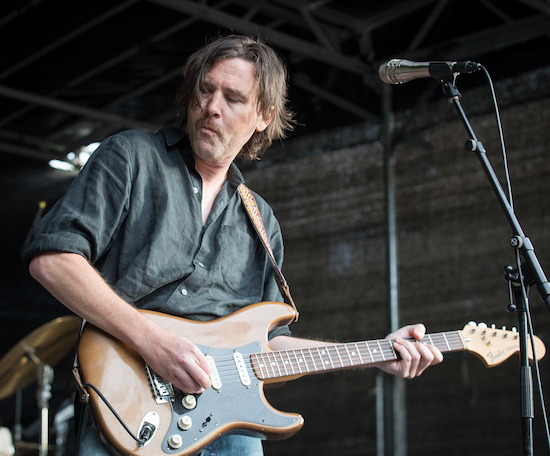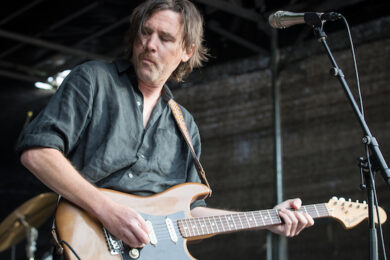Photo: Tore Sætre / Wikimedia
The songs of Cass McCombs, ever since his career began in the early 2000s, have generally resisted specific interpretation – with a few exceptions, they have remained elusive and ambiguous. However, if there was one track that could serve as a single apposite representation of many of his lyrical preoccupations, it might be ‘Home on the Range’ from the 2015 album Big Wheel and Others. The opening line is, “I believe in littering / Waste should not be hidden but seen,” and later he sings, “I believe in junk food / In solidarity with the poor and screwed.” Any close follower of the Californian singer-songwriter’s work might find these lines echoing through their head as they read his first volume of poetry.
One common thread that does emerge on several of McCombs’s nine studio albums is an identification with, and poeticisation of, society’s fringe-dwellers. This might include the poverty-stricken, low-level criminals, outcasts and itinerants. These sub-cultures are imbued with dignity, authenticity and humour that, in the hands of another writer, might become an exercise in fetishisation. McCombs, though, is a songwriter of the brutal detail, and his poetry has a similar visual tautness. This collection is a sharp depiction of violence, corruption and sordidness, yet at the same time displaying a nuanced understanding of history and fragments of political theory.
The first third of Toy Fabels (fifteen poems, to be precise, that are, oddly, sequenced in reverse alphabetical order) deals with the murky but heroic world of graffiti artists in the Bay Area of Northern California. The ‘toy’ of the book’s title, according to Urban Dictionary, is a pejorative term for a novice tagger (the ‘fabel’, on the other hand, is a term from Brechtian theatre describing an analytical summary of a play or scene, emphasising subtexts and symbolism).
The very first poem, ‘We Made Our Mops’ is an introduction to the ethos of the young graffitist:
however deviant, it’s all a game
no way to justify except that I love to roam around at night
to places that I shouldn’t have been
muni yards and tunnels
drunk retarded
going over laboured pieces as a gag
when the throwup emigrated west
the uglier and the bigger was the better.
Many poems portray this glee at covertly sneaking around at night, defacing public walls. This, the poetry suggests, is the most authentic way to know a city (the city, in these poems, being San Francisco, mostly). The night-crawling tagger also witnesses extraordinary things: ‘Big Foot’, for example, describes a surreal run-in with the folkloric beast in the North Bay city of San Rafael. However, this innocence is counterbalanced by the extreme violence of this nocturnal life. In ‘We Made Our Mops’, the speaker is badly beaten, perhaps murdered, as he recounts “memories streaming / from a hole in the back of my head” (a character speaking from beyond the grave returns later in ‘I Was Killed by a Vietnam Vet’).
Violence continues with ‘A Violent Story’, a vivid prose poem replete with gangland brutality. Here, “a guy gets his ear ripped off with a hammer” and the speaker graphically explains the grim practice of ‘curbing’ (as made famous in the film American History X). With mention of curbing, the collection flirts with body horror, which recurs somewhat in the following poem, ‘Two Kinds of People’, with its reference to the 1996 Butthole Surfers album Electriclarryland. The record has a distinctly unlovely cover image, which McCombs envisages as a giant billboard towering over San Francisco.
Violence and criminality are not the only themes of the graffiti section of Toy Fabels. Some poems see the tagger justifying their actions ideologically, and others express a Marxism-influenced take on the theory behind graffiti. ‘Tagging a Church’ lists many of the nefarious activities of institutionalised religion – greed, abuse, hypocrisy – and contrasts it with the comparatively minor crime of spray-painting a church: “we start wars for oil and chop up children with daisycutter bombs and people get enraged when property is vandalized?”
A more interesting poem is ‘Southbay Style’, one of the strongest in the collection. This piece perhaps represents the essence of the graffiti poems, as it beautifully deconstructs why polite society has a strong aversion to this art.
…if you spend your time making things square people don’t like, square people don’t like you and it eats at you, you read stuff like French situationist texts and that kind of thing and from that perspective, it’s pure because there’s no money involved, it’s not for sale, temporary…
Graffiti is threatening because it is a crime without economic reason: there is no theft of money or property; it is not driven by material want. The poem implies that this makes tagging particularly unpalatable among “squares” – it is gratuitous, and comes from a motive, which for them, is unrelatable. It is baffling, therefore dangerous. Also, the relationship between “French situationist texts” and graffiti is well established – godfather of the Situationists Guy Debord’s famous slogan “never work” was scrawled all over Paris in the late 60s. Indeed, the spirit of Debord – his theories of anti-consumerism and the inherent alienation of social relations – hovers over the graffiti poems.
The graffiti section of the book eventually fizzles out and the rest of Toy Fabels is made up of a rich assortment of poems that play with different topics. Several address technology, while there are also meditations on aesthetics, strange re-imaginings of historical and mythical figures, and plenty of politics – many poems are populated by so-called ‘heroes of the left’. One of these, ‘A Public Mural’, is simply a long list of such icons alongside an abstruse reference to their life and legacy, beginning with Emma Goldman (“dance of the hippopotamus to rattle open the prison gate”) and concluding with Bernadette Devlin (“the troubles bullhorn making sense”).
Other poems are weirder still, such as the fantastic ‘Paperclip when Science Evolves’, an impenetrable but dazzling jumble of apparently spontaneously arranged words (in its experimentation, perhaps the linguistic equivalent of his 2015 sound collage ‘Texas’).
The most urgent poems of the book’s second section are those that engage with aspects of present-day culture. McCombs occasionally does this in his music, most memorably with the uncharacteristically direct protest song ‘Bradley Manning’ from 2011. Here, poems ponder the peculiarities and the consequences of our digital lives. The four-line poem, ‘Artisanal Pornography’ could almost be the starting and finishing points of a particularly digressive trawl on Wikipedia:
Beginning with the Audre Lord poem,
‘Who said it was simple?’
And ending with a recipe for
Brown butter cherry clafoutis
‘Thank You Coders’, meanwhile, frolics in the ‘glitches’ or new linguistic patterns born of the digital landscape: “Thank you for this magneticape wrung round found under streaming overpast”.
Throughout his music career, McCombs has been famously unwilling to conduct interviews or participate in the media merry-go-round that usually comes with the release of an album. I’ve also been at many concerts where he has played for up to two hours without addressing a single word to the audience. McCombs has long refused to play the game of imagery and pretence that is inherent to popular music. His is a resistance to becoming, as the historian Daniel J. Boorstin put it in in his famous book The Image (1962), a “human pseudo-event”. Alongside this is a steadfast belief that his music needs no more context or backstory than itself.
Two poems in Toy Fabels can be interpreted as ruminations on these attitudes. One, ‘A Prayer’, is a short poem that lists (there are many lists in Toy Fabels) the people for whom art must be created, in its capacity to serve the dispossessed and the disadvantaged – as opposed to any notion that it is primarily the expression or celebration of an individual’s creativity.
We dance for those who cannot dance.
We sing for those who cannot sing.
We dance for those who are incarcerated.
We dance for the injured
and the afflicted.
For the addict. For the homeless.
…
We dance not for those who can dance.
We dance not for ourselves.
This is far from the strongest poem in the collection, but it arguably offers some insight into McCombs’s artistic motivations. To be an artist is, above all, to be in service to others. An artist of this kind, such as McCombs, takes care to avoid self-mythology – something that many musicians actively cultivate. According to ‘A Prayer’, the creator’s ego and self-image should be irrelevant and ideally non-existent – the artist operates only as a servant of “those who cannot dance”.
The other poem of note, in terms of potential indications of the poet’s values, is ‘A Free Song’. This one rebuffs the clinical commodification of art under late capitalism, and offers what comes across as an anarchism-influenced position on the subject.
This song is free
I mean it doesn’t cost a thing
And you can’t buy it
Because it’s not for sale
This song is worthless
Got no practical value, no msrp
And it could easily disappear forever
Because it is free
…
When there’s nothing to manufacture
Then there’s nothing to defend
And you won’t need to be starting war
Because you’d be free
The line “got no practical value, no msrp” harks back to the earlier graffiti poem ‘Southbay Style’. The ‘song’ at its purest, like the graffiti tag, should be driven by no economic or material motivations and make no attempt at gain or profit. Toy Fabels, therefore, suggests an ideological correlation between McCombs’s music (and poetry) and the anarchic spirit of the tagger.
In terms of poetic form, Toy Fabels consists of dense prose poems, the odd poem with cascading line breaks and spacings that scatter across the page, dialogues, imagistic fragments, and, of course, lists. The pages are also interspersed with sketches, mostly of people or faces. Charles Bukowski is an easy pick as an influence – without, mind you, the misanthropy, nihilism and misogyny. The more endearing side of Jack Kerouac also comes to mind: in some poems, such as ‘Disjecta Membra’, McCombs explores the mystery of childhood memories in a way that dimly recalls Dr Sax. ‘Desert Sundown’, which lists favourite baseball players from history and those with ‘great baseball names’ (like Catfish Hunter, Rollie Fingers or Oil Can Boyd), is pure Kerouacian romance. Audre Lorde, whose name crops up in two poems in Toy Fabels, is also a clear inspiration.
McCombs’s first collection is an exciting sidebar in what continues to be an absorbing and uncompromising artistic career. Toy Fabels is certainly rooted in sub-culture and polemic, yet with its strange and macabre beauty and integral intransigent spirit, it holds universal impact – much like his music.
Toy Fabels is out now through Spurl Editions



